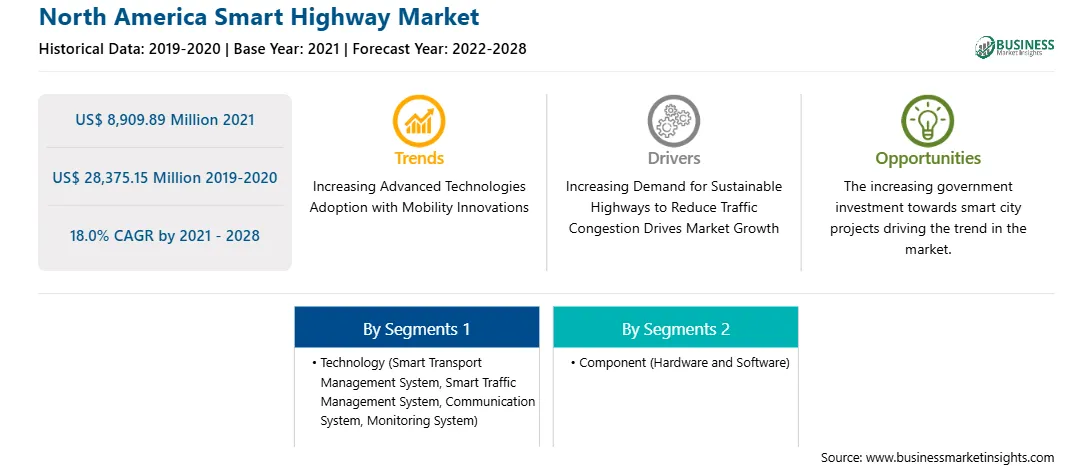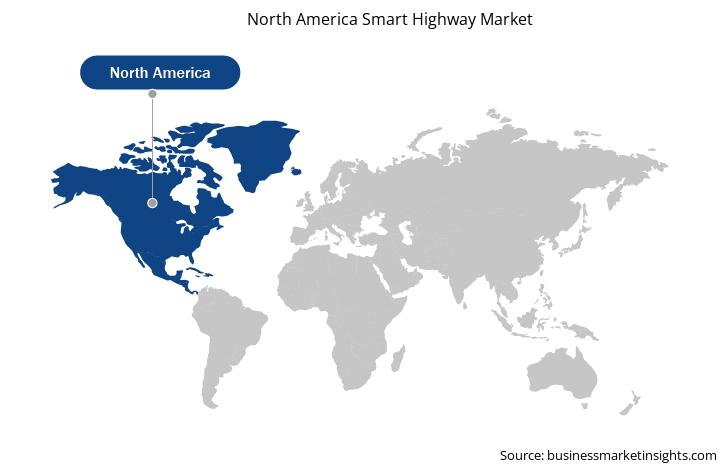Market Introduction
North America’s growing reliance on cars and a rapidly aging highway infrastructure compromising safety, efficiency, and promoting congestion are paving the way for deploying smart highway infrastructure solutions. Increasing global trade and rising intercity travel have increased traffic on highways at a tremendous rate. Thus, governments are encouraging the construction of smart highways to reduce the travel time and burden on highways. Intelligent Transportation Systems (ITS) technologies offer the best solutions to a broad range of problems, such as controlling the flow of information among vehicles and the infrastructure, maximizing safety, and relieving congestion and associated costs. Other benefits offered by the ITS solutions include collision detection and warning, guidance devices, electronic brakes, and electronically controlled steering, which is anticipated to boost the market growth during the forecast period. The government is investing actively towards the improved use of existing roadways, construction of new highways, reduction in traffic accidents, and conservation of energy resources. The US Department of Energy & Transportation is promoting R&D to help develop innovative smart transportation solutions and alternative fuel technologies. The Automated Highway System (AHS) program is a government-industry-academia collaboration to improve the safety, mobility, and quality of highway travel in the US using automated control technologies. The growing incorporation of intelligent systems in a highway setting and on vehicles is promoting the AHS's objectives and bolstering the smart highway market growth in North America.
The enactment of lockdowns and travel restrictions, shutdown of production facilities, and the shortage of employees had adversely affected the performances of major players in the mobility and transportation industry in North America. The US notably witnessed the most severe impact of the COVID-19 outbreak in 2020. The initial data from a national survey of connected vehicles, a 20% drop in the average distances driven and several critical shifts in driving behavior were recorded. Additionally, the survey's key findings reported a 17% rise in speeding, a 10% increase in failures to adhere to road signs, and a 15% increase in harsh-cornering events. The year 2020 has declined growth for the market, however, from the beginning of 2021 market gained the momentum. Various industry players have been developing and implementing solutions to keep motorists informed and safe on the roads, more so to avoid the pandemic's spread and ensure travelers' safety in a scenario of changing driving behavior. For instance, IBI Group collaborated with the Ministry of Transportation of Ontario (MTO) to develop the 511 Ontario mobile application, introducing the Trucker Mode feature, which enables commercial vehicle operators to access helpful information about the essential touch points along their highway routes, including service and rest stations that are open throughout the crisis. Furthermore, as the electrification of vehicles, including trailers, trucks, and transit buses, becomes pervasive and an ongoing trend of electric cars, traversing the route efficiently also requires intelligent electric vehicle charging solutions along the highway. Therefore, the market is gaining momentum in the region, owing to the infrastructural readiness of the region and the rising requirement of intelligent traffic management and mobility solutions for smart highways.
Market Overview and Dynamics
The smart highway market in North America is expected to grow US$ 8,909.89 million in 2021 to US$ 28,375.15 million by 2028; it is estimated to grow at a CAGR of 18.0% from 2021 to 2028. Various technologies, such as ad-hoc mesh Wi-Fi and Cellular Vehicle-to-Everything (C-V2X), keep the drivers informed of the changes in traffic lights and communicate with other vehicles to avoid collisions. Innovations in digital technologies are anticipated to provide lucrative growth opportunities for the smart highway market players during the forecast period. Governments across the region are significantly investing in connected vehicles technologies to boost the smart highway market growth. For instance, The Colorado Department of Transportation plans to equip 2,500 government vehicles with C-V2X and Dedicated Short-Range Communications (DSRC) technologies in 10 years. In the coming years digital Reality is expected to play a greater role in the smart car interactions with infrastructures around them. The automotive industry has made huge strides on the Internet of Vehicles (IoV). Machine learning can enable automakers to monitor their vehicles in real-world environment handling scenarios, such as changes in driving conditions. Glow in dark roads and road lights activated by motion sensors to illuminate a particular section are also growing rapidly. Solar-powered roadways are gaining rapid traction among highway professionals.
Key Market Segments
In terms of technology, the smart transport management system segment accounted for the largest share of the North America smart highway market in 2020. In term of component, hardware segment held a larger market share of the smart highway market in 2020.
Major Sources and Companies Listed
A few major primary and secondary sources referred to for preparing this report on the smart highway market in North America are company websites, annual reports, financial reports, national government documents, and statistical database, among others. Major companies listed in the report are Cisco Systems, Inc.; Huawei Technologies Co., Ltd.; Kapsch TrafficCom AG; Nokia Coropration; Siemens AG; Conduent, Inc.; Toshiba Corporation; Nippon Koei, Co., Ltd.; Telegra; and IBI Group among others.
Reasons to buy report
North America Smart Highway Market Segmentation
North America Smart Highway Market – By Technology
North America Smart Highway Market – By
Component
North America Smart Highway Market – By
Country
North America Smart Highway Market – Companies Mentioned
Strategic insights for the North America Smart Highway provides data-driven analysis of the industry landscape, including current trends, key players, and regional nuances. These insights offer actionable recommendations, enabling readers to differentiate themselves from competitors by identifying untapped segments or developing unique value propositions. Leveraging data analytics, these insights help industry players anticipate the market shifts, whether investors, manufacturers, or other stakeholders. A future-oriented perspective is essential, helping stakeholders anticipate market shifts and position themselves for long-term success in this dynamic region. Ultimately, effective strategic insights empower readers to make informed decisions that drive profitability and achieve their business objectives within the market.

| Report Attribute | Details |
|---|---|
| Market size in 2021 | US$ 8,909.89 Million |
| Market Size by 2028 | US$ 28,375.15 Million |
| Global CAGR (2021 - 2028) | 18.0% |
| Historical Data | 2019-2020 |
| Forecast period | 2022-2028 |
| Segments Covered |
By Technology
|
| Regions and Countries Covered | North America
|
| Market leaders and key company profiles |
The geographic scope of the North America Smart Highway refers to the specific areas in which a business operates and competes. Understanding local distinctions, such as diverse consumer preferences (e.g., demand for specific plug types or battery backup durations), varying economic conditions, and regulatory environments, is crucial for tailoring strategies to specific markets. Businesses can expand their reach by identifying underserved areas or adapting their offerings to meet local demands. A clear market focus allows for more effective resource allocation, targeted marketing campaigns, and better positioning against local competitors, ultimately driving growth in those targeted areas.

The North America Smart Highway Market is valued at US$ 8,909.89 Million in 2021, it is projected to reach US$ 28,375.15 Million by 2028.
As per our report North America Smart Highway Market, the market size is valued at US$ 8,909.89 Million in 2021, projecting it to reach US$ 28,375.15 Million by 2028. This translates to a CAGR of approximately 18.0% during the forecast period.
The North America Smart Highway Market report typically cover these key segments-
The historic period, base year, and forecast period can vary slightly depending on the specific market research report. However, for the North America Smart Highway Market report:
The North America Smart Highway Market is populated by several key players, each contributing to its growth and innovation. Some of the major players include:
The North America Smart Highway Market report is valuable for diverse stakeholders, including:
Essentially, anyone involved in or considering involvement in the North America Smart Highway Market value chain can benefit from the information contained in a comprehensive market report.